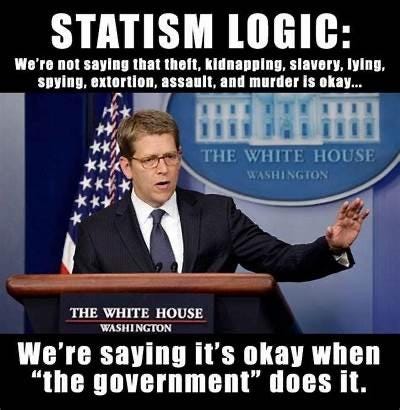From the White-PillBox: Part 49
Another logically inconsistent position of statism: right and wrong applies the same to everyone; right and wrong does not apply to the State.
This installment of the White Pill series offers another example of the internal contradictions of statism. As explained in essay 36, one of statism’s fundamental weaknesses (and thus a major White Pill) is how so many of its positions lead to logical inconsistencies.
In this essay we examine the statist’s view of morality (right and wrong). As is often the case, statists at first agree with the plain common sense position: that morality applies to everyone, equally. Yet at the same time, morality is altered for people in government; they may do things no one else can.
The obvious: right and wrong apply the same to everyone
As long as the discussion is clear and personal, statists are on board with this. Stealing property; attacking innocent people; enslaving others…the violation of consent is wrong, no matter who does it.
Now bring government into the picture
It is here that statists will twist right and wrong into a hodgepodge of vague and unintelligible contradictions. No longer is it a person initiating violence against others. It is an ill-defined entity called “government” that can tax, attack others, and put people in cages for actions that harm no one. The statist convinces himself that government is something other that what it is: people. He sidesteps the harsh truth that he supports these particular people performing actions that, in a clearer context, are plainly immoral.
Somehow mere mortals, acting in the role of State law makers and enforcers, can turn morality on its head.
It’s the law!
Statists like to hide behind that phrase, as if it’s a compelling, rational, and logical argument. But legislation can’t transform an immoral act into a moral one. That idea is demolished simply by considering the laws that permitted slavery. Scribbling words on paper did not magically change the immorality of owning other humans into a moral act. If a thing is wrong, specially shaped ink scratches cannot change that.
Unless of course you are in the head of a statist.
But they represent us!
This is yet another way for the statist to contradict himself. He believes that certain people acquire special rights, by means of getting enough voters to elect them. At which point the rules of morality no longer apply.
But all the statist accomplishes is justify one contradiction by appealing to others, namely, the parade of contradictions inherent to democracy. Not to mention his other logical problem: that you can’t delegate to someone else a right that you don’t have in the first place.
In comes the mental fog
The statist senses the contradiction and use mental gymnastics to evade the fact that people are people. He needs to blur his inner sense of fairness.
And here, the traditions of the State help him. They serve up rituals and rhetoric; patriotism and flag waving; all to create a fog in the statist’s mind that permit him to mask his inconsistencies.
The most hopeless of statists
Those who are utterly indoctrinated go so far as to believe government defines morality. These are the types that would have supported slavery, the World War II internment of the Japanese, etc. strictly because the law permitted it. Marching Jews into ovens was apparently moral, since it was after all legal.
The most damning aspect of the contradiction
Among the key attributes that make us human are our conscience (that underlying, inner moral sense we all have 1), and our free will. And these faculties make social interaction possible, peaceful, and productive.
The statist of course has a conscience as well, and generally makes choices to act according to those sensibilities.
But he contradicts his nature in the worst way, in his advocacy for the State. What he would never permit in private interactions, he permits to those acting for the State. He permits humans to be inhuman.
But worse for the statist, he has made the free choice to abdicate his own conscience. He sacrifices that which defines his very character (his moral self), in deference to the State. And ironically, he admits his support for the State reflects his conscience.
He all but damns himself. His very humanity - his mind, his ability to choose actions that are right or wrong, his capacity to judge others’ actions as right or wrong - is tossed aside, and replaced with cult-like obedience to authority.
He rarely asks himself: if a law were in place that defied his morality (for example, a law requiring he hand over his child for medical experimentation), which would he rank higher: his conscience, or the law? But he does not ask himself this question, because he senses the struggle of his contradiction.
He fails to realize that there is no contradiction, so long as we rank our conscience above what any law happens to say.
Conclusion
It seems a Black Pill, to consider that virtually everyone, as a default believer in the State, has an inconsistent conception of morality. Our White Pill is less obvious, but it’s there:
The contradiction of statism’s inverted morality is a massive crack in its foundation. It is another reason to see statism as the house of cards that it is.
Moreover, it is one of those White Pills that also serves as a potent Red Pill. Because once the uninitiated see it, it is hard to unsee.
Except for those with true mental deficiency of the moral sense, such as psychopaths. Thankfully these are relatively rare among the population.

